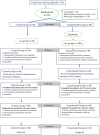Impact of virtual problem-based learning of cardiopulmonary resuscitation on fourth-year nursing students' satisfaction and performance: a quasi-experimental study
- PMID: 38641600
- PMCID: PMC11031998
- DOI: 10.1186/s12909-024-05375-5
Impact of virtual problem-based learning of cardiopulmonary resuscitation on fourth-year nursing students' satisfaction and performance: a quasi-experimental study
Abstract
Background: Regarding competency of nursing students in cardiopulmonary resuscitation (CPR), nursing students frequently exhibit inadequate performance and low satisfaction levels regarding CPR training methods. The problem-based learning (PBL) method, characterized by a constructivist approach, has been underutilized for CPR training, particularly in a virtual format. Hence, this study aims to assess the influence of virtual problem-based learning in cardiopulmonary resuscitation on the satisfaction and performance of fourth-year nursing students.
Methods: This quasi-experimental study, conducted in 2022, involved 80 final-year nursing students from Hamadan University of Medical Sciences, Iran. The participants were randomly assigned to either the experimental group (N = 40) or the control group (N = 40). The experimental group was further divided into six smaller groups on WhatsApp. Both groups initially received routine training sessions, after which the experimental group engaged in four problem-based learning sessions across three different scenarios. Data collection included demographic information, a teaching satisfaction questionnaire, and cardiopulmonary resuscitation checklists administered immediately and one month after the intervention.
Results: The study was initiated and concluded with 80 participants. The study commenced with no significant disparity in the mean scores of cardiopulmonary resuscitation performance, encompassing chest compressions (P = 0.451) and airway management (P = 0.378), as well as teaching satisfaction (p = 0.115) among the nursing students between the experimental and control groups. However, subsequent to the intervention, both immediately and one month later, the experimental group displayed notable enhancements in mean scores for cardiopulmonary resuscitation performance, comprising chest compressions (p < 0.001) and airway management (p < 0.001), as well as teaching satisfaction (p < 0.001) compared to the control group.
Conclusion: Based on the study's findings, it is recommended that nursing educators implement this approach in their teaching practices.
Keywords: Cardiopulmonary resuscitation; Nursing students; Performance; Problem-based learning; Satisfaction.
© 2024. The Author(s).
Conflict of interest statement
All the authors of this paper agree on the absence of any conflict of interest.
Similar articles
-
The effect of spaced E-Learning on knowledge of basic life support and satisfaction of nursing students: a quasi-experimental study.BMC Med Educ. 2024 May 15;24(1):537. doi: 10.1186/s12909-024-05533-9. BMC Med Educ. 2024. PMID: 38750506 Free PMC article.
-
Effectiveness of simulation-based cardiopulmonary resuscitation training programs on fourth-year nursing students.Australas Emerg Care. 2021 Mar;24(1):4-10. doi: 10.1016/j.auec.2020.08.005. Epub 2020 Sep 12. Australas Emerg Care. 2021. PMID: 32933888
-
Combination of problem-based learning with high-fidelity simulation in CPR training improves short and long-term CPR skills: a randomised single blinded trial.BMC Med Educ. 2019 May 31;19(1):180. doi: 10.1186/s12909-019-1626-7. BMC Med Educ. 2019. PMID: 31151450 Free PMC article. Clinical Trial.
-
Comparison of gamification and role-playing education on nursing students' cardiopulmonary resuscitation self-efficacy.BMC Med Educ. 2024 Mar 4;24(1):231. doi: 10.1186/s12909-024-05230-7. BMC Med Educ. 2024. PMID: 38438893 Free PMC article.
-
The effects of using problem-based learning in the clinical nursing education on the students' outcomes in Iran: a quasi-experimental study.Nurse Educ Pract. 2014 Nov;14(6):698-703. doi: 10.1016/j.nepr.2014.10.002. Epub 2014 Oct 22. Nurse Educ Pract. 2014. PMID: 25458229 Clinical Trial.
Cited by
-
Impact of flipped classroom-based simulation of CPR on nursing students' self-confidence, satisfaction, knowledge and skill: a quasi-experimental study.BMC Med Educ. 2025 Jul 1;25(1):980. doi: 10.1186/s12909-025-07525-9. BMC Med Educ. 2025. PMID: 40597084 Free PMC article.
-
The use of social media platforms in adult basic life support research: a scoping review.Resusc Plus. 2025 Apr 4;23:100953. doi: 10.1016/j.resplu.2025.100953. eCollection 2025 May. Resusc Plus. 2025. PMID: 40297167 Free PMC article. Review.
-
Effects of virtual counseling on the care burden and quality of life of family caregivers for leukemia patients: a randomized controlled trial study.BMC Nurs. 2025 Feb 18;24(1):189. doi: 10.1186/s12912-025-02840-4. BMC Nurs. 2025. PMID: 39966850 Free PMC article.
-
Enhancing medical education for undergraduates: integrating virtual reality and case-based learning for shoulder joint.BMC Med Educ. 2024 Oct 7;24(1):1103. doi: 10.1186/s12909-024-06103-9. BMC Med Educ. 2024. PMID: 39375643 Free PMC article. Clinical Trial.
References
-
- Greif R, Bhanji F, Bigham BL, Bray J, Breckwoldt J, Cheng A, Duff JP, Gilfoyle E, Hsieh M-J, Iwami T. Education, implementation, and teams: 2020 international consensus on cardiopulmonary resuscitation and emergency cardiovascular care science with treatment recommendations. Circulation. 2020;142(16suppl1):S222–83. doi: 10.1161/CIR.0000000000000896. - DOI - PubMed
-
- Berg KM, Soar J, Andersen LW, Böttiger BW, Cacciola S, Callaway CW, Couper K, Cronberg T, D’Arrigo S, Deakin CD. Adult advanced life support: 2020 international consensus on cardiopulmonary resuscitation and emergency cardiovascular care science with treatment recommendations. Circulation. 2020;142(16suppl1):S92–139. doi: 10.1016/j.resuscitation.2020.09.012. - DOI - PubMed
-
- Olasveengen TM, Mancini ME, Perkins GD, Avis S, Brooks S, Castrén M, Chung SP, Considine J, Couper K, Escalante R. Adult basic life support: international consensus on cardiopulmonary resuscitation and emergency cardiovascular care science with treatment recommendations. Resuscitation. 2020;156:A35–79. doi: 10.1016/j.resuscitation.2020.09.010. - DOI - PMC - PubMed
MeSH terms
LinkOut - more resources
Full Text Sources
Medical


